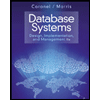
Modern Database Management
13th Edition
ISBN: 9780134792293
Author: Hoffer
Publisher: PEARSON
expand_more
expand_more
format_list_bulleted
Concept explainers
Textbook Question
Chapter 4, Problem 4.5RQ
Summarize six important properties of relations.
Expert Solution & Answer
Want to see the full answer?
Check out a sample textbook solution
Students have asked these similar questions
Write a FancyCar class to support basic operations such as drive, add gas, honk horn, and start engine. FancyCar.java is provided with method stubs. Follow each step to gradually complete all methods.
Note: This program is designed for incremental development. Complete each step and submit for grading before starting the next step. Only a portion of tests pass after each step but confirm progress. The main() method includes basic method calls. Add statements in main() as methods are completed to support development mode testing.
Step 0. Declare private fields for miles driven as shown on the odometer (int), gallons of gas in tank (double), miles per gallon or MPG (double), driving capacity (double), and car model (String). Note the provided final variable indicates the gas tank capacity of 14.0 gallons.
Step 1 (2 pts). 1) Complete the default constructor by initializing the odometer to five miles, tank is full of gas, miles per gallon is 24.0, and the model is "Old Clunker". 2)…
Find the error:
daily_sales = [0.0, 0.0, 0.0, 0.0, 0.0, 0.0, 0.0]
days_of_week = ['Sunday', 'Monday', 'Tuesday',
'Wednesday', 'Thursday', 'Friday',
'Saturday']
for i in range(7):
daily_sales[i] = float(input('Enter the sales for ' \
+ day_of_week[i] + ': ')
Find the error:
daily_sales = [0.0, 0,0, 0.0, 0.0, 0.0, 0.0, 0.0]
days_of_week = ['Sunday', 'Monday', 'Tuesday',
'Wednesday', 'Thursday', 'Friday',
'Saturday']
for i in range(7):
daily_sales[i] = float(input('Enter the sales for ' \
+ days_of_week[i] + ': ')
Chapter 4 Solutions
Modern Database Management
Ch. 4 - Define each of the following terms: determinant...Ch. 4 - Prob. 4.2RQCh. 4 - Prob. 4.3RQCh. 4 - Describe the primary differences between the...Ch. 4 - Summarize six important properties of relations.Ch. 4 - Describe two properties that each candidate key...Ch. 4 - Describe the three types of anomalies that can...Ch. 4 - Demonstrate each of the anomaly types with an...Ch. 4 - Fill in the blanks in each of the following...Ch. 4 - What is a well-structured relation? Why are...
Ch. 4 - Prob. 4.11RQCh. 4 - Describe how the following components of an E-R...Ch. 4 - Prob. 4.13RQCh. 4 - Prob. 4.14RQCh. 4 - Briefly describe four typical problems that often...Ch. 4 - Prob. 4.16RQCh. 4 - Explain how each of the following types of...Ch. 4 - Prob. 4.18RQCh. 4 - Prob. 4.19RQCh. 4 - Prob. 4.20RQCh. 4 - Prob. 4.21RQCh. 4 - What is the relationship between the primary key...Ch. 4 - Prob. 4.23RQCh. 4 - Explain what can be done with primary keys to...Ch. 4 - Prob. 4.25RQCh. 4 - Explain three conditions that suggest a surrogate...Ch. 4 - Prob. 4.27RQCh. 4 - For each of the following E-R diagrams from...Ch. 4 - Prob. 4.29PAECh. 4 - Prob. 4.30PAECh. 4 - For your answers to the following Problems and...Ch. 4 - Figure 4-3212 shows a class list for Millennium...Ch. 4 - Prob. 4.33PAECh. 4 - Prob. 4.34PAECh. 4 - Prob. 4.35PAECh. 4 - Prob. 4.36PAECh. 4 - Prob. 4.37PAECh. 4 - Prob. 4.38PAECh. 4 - Prob. 4.39PAECh. 4 - Transform Figure 2-15a, attribute version, to 3NF...Ch. 4 - The Public Safety office at Millennium College...Ch. 4 - Prob. 4.42PAECh. 4 - Prob. 4.43PAECh. 4 - Prob. 4.44PAECh. 4 - For your answers to Problem and Exercise 3-33 from...Ch. 4 - Prob. 4.46PAECh. 4 - Prob. 4.47PAECh. 4 - Figure 4-38 includes an EER diagram for a...Ch. 4 - Prob. 4.49PAECh. 4 - Prob. 4.50PAECh. 4 - Prob. 4.51PAECh. 4 - Prob. 4.52PAECh. 4 - Figure 4-40 shows an EER diagram for a university...Ch. 4 - Explore the data included in Table 4-9. Assume...Ch. 4 - Prob. 4.55PAECh. 4 - Prob. 4.56PAECh. 4 - Prob. 4.57PAECh. 4 - Prob. 4.58PAE
Knowledge Booster
Learn more about
Need a deep-dive on the concept behind this application? Look no further. Learn more about this topic, computer-science and related others by exploring similar questions and additional content below.Similar questions
- Find the error: daily_sales = [0.0, 0.0, 0.0, 0.0, 0.0, 0.0, 0.0] days_of_week = ['Sunday', 'Monday', 'Tuesday', 'Wednesday', 'Thursday', 'Friday', 'Saturday'] for i in range(6): daily_sales[i] = float(input('Enter the sales for ' \ + days_of_week[i] + ': '))arrow_forwardWhat are the steps you will follow in order to check the database and fix any problems with it and normalize it? Give two references with your answer.arrow_forwardWhat are the steps you will follow in order to check the database and fix any problems with it? Have in mind that you SHOULD normalize it as well. Consider that the database offline is not allowed since people are connected to it and personal data might be bridged and not secured. Provide three refernces with you answer.arrow_forward
- Should software manufacturers should be tolerant of the practice of software piracy in third-world countries to allow these countries an opportunity to move more quickly into the information age? Why or why not?arrow_forwardI would like to know about the features of Advanced Threat Protection (ATP), AMD-V, and domain name space (DNS).arrow_forwardPlease show the code for the Tikz figurearrow_forward
- Modern life has been impacted immensely by computers. Computers have penetrated every aspect of oursociety, either for better or for worse. From supermarket scanners calculating our shopping transactionswhile keeping store inventory; robots that handle highly specialized tasks or even simple human tasks,computers do much more than just computing. But where did all this technology come from and whereis it heading? Does the future look promising or should we worry about computers taking over theworld? Or are they just a necessary evil? Provide three references with your answer.arrow_forwardWhat are the steps you will follow in order to check the database and fix any problems with it? Have in mind that you SHOULD normalize it as well. Describe in full, consider the following:• Taking the database offline is not allowed since people are connected to it.• Personal data might be bridged and not secured. Provide three refernces with you answerarrow_forwardYou are called by your supervisor to go and check a potential data bridge problem. What are the stepsyou will follow in order to check the database and fix any problems with it? Have in mind that youSHOULD normalize it as well. Describe in full, consider the following:• Taking the database offline is not allowed since people are connected to it.• Personal data might be bridged and not secured. Provide three refernces with you answerarrow_forward
arrow_back_ios
SEE MORE QUESTIONS
arrow_forward_ios
Recommended textbooks for you
 Fundamentals of Information SystemsComputer ScienceISBN:9781337097536Author:Ralph Stair, George ReynoldsPublisher:Cengage Learning
Fundamentals of Information SystemsComputer ScienceISBN:9781337097536Author:Ralph Stair, George ReynoldsPublisher:Cengage Learning Principles of Information Systems (MindTap Course...Computer ScienceISBN:9781305971776Author:Ralph Stair, George ReynoldsPublisher:Cengage Learning
Principles of Information Systems (MindTap Course...Computer ScienceISBN:9781305971776Author:Ralph Stair, George ReynoldsPublisher:Cengage Learning Database Systems: Design, Implementation, & Manag...Computer ScienceISBN:9781305627482Author:Carlos Coronel, Steven MorrisPublisher:Cengage Learning
Database Systems: Design, Implementation, & Manag...Computer ScienceISBN:9781305627482Author:Carlos Coronel, Steven MorrisPublisher:Cengage Learning Database Systems: Design, Implementation, & Manag...Computer ScienceISBN:9781285196145Author:Steven, Steven Morris, Carlos Coronel, Carlos, Coronel, Carlos; Morris, Carlos Coronel and Steven Morris, Carlos Coronel; Steven Morris, Steven Morris; Carlos CoronelPublisher:Cengage Learning
Database Systems: Design, Implementation, & Manag...Computer ScienceISBN:9781285196145Author:Steven, Steven Morris, Carlos Coronel, Carlos, Coronel, Carlos; Morris, Carlos Coronel and Steven Morris, Carlos Coronel; Steven Morris, Steven Morris; Carlos CoronelPublisher:Cengage Learning A Guide to SQLComputer ScienceISBN:9781111527273Author:Philip J. PrattPublisher:Course Technology Ptr
A Guide to SQLComputer ScienceISBN:9781111527273Author:Philip J. PrattPublisher:Course Technology Ptr Principles of Information Systems (MindTap Course...Computer ScienceISBN:9781285867168Author:Ralph Stair, George ReynoldsPublisher:Cengage Learning
Principles of Information Systems (MindTap Course...Computer ScienceISBN:9781285867168Author:Ralph Stair, George ReynoldsPublisher:Cengage Learning

Fundamentals of Information Systems
Computer Science
ISBN:9781337097536
Author:Ralph Stair, George Reynolds
Publisher:Cengage Learning

Principles of Information Systems (MindTap Course...
Computer Science
ISBN:9781305971776
Author:Ralph Stair, George Reynolds
Publisher:Cengage Learning

Database Systems: Design, Implementation, & Manag...
Computer Science
ISBN:9781305627482
Author:Carlos Coronel, Steven Morris
Publisher:Cengage Learning

Database Systems: Design, Implementation, & Manag...
Computer Science
ISBN:9781285196145
Author:Steven, Steven Morris, Carlos Coronel, Carlos, Coronel, Carlos; Morris, Carlos Coronel and Steven Morris, Carlos Coronel; Steven Morris, Steven Morris; Carlos Coronel
Publisher:Cengage Learning

A Guide to SQL
Computer Science
ISBN:9781111527273
Author:Philip J. Pratt
Publisher:Course Technology Ptr

Principles of Information Systems (MindTap Course...
Computer Science
ISBN:9781285867168
Author:Ralph Stair, George Reynolds
Publisher:Cengage Learning
Enhanced Entity Relationship Model; Author: Data Science Center;https://www.youtube.com/watch?v=ocQUtXPumdQ;License: Standard YouTube License, CC-BY